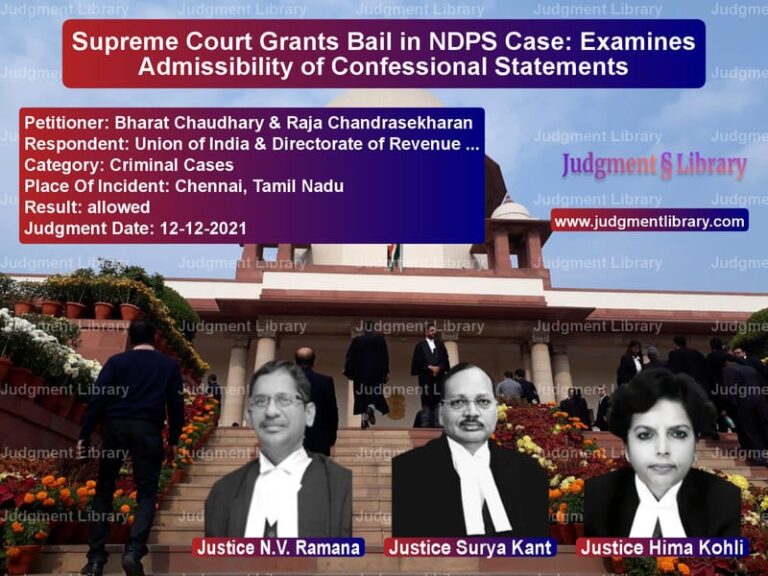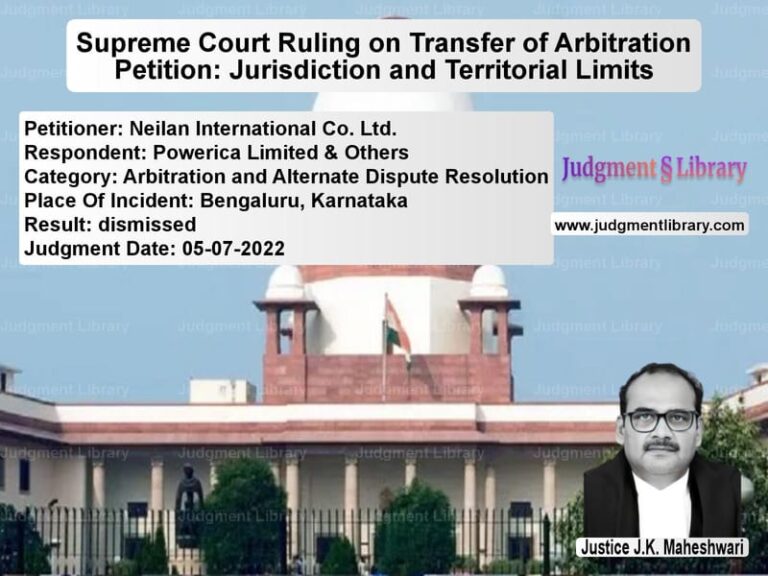Supreme Court Ruling on Jurisdiction in Transfer of Cases: Implications for CAT Proceedings
The Supreme Court in Union of India v. Sanjiv Chaturvedi & Ors. addressed a significant legal issue concerning the jurisdiction of High Courts in challenging transfer orders issued by the Central Administrative Tribunal (CAT). The case centered on whether the Principal Bench of CAT in New Delhi holds exclusive authority over cases of national importance or if matters can be adjudicated at regional benches. The ruling has far-reaching consequences for government employees and the administration of justice within CAT.
Background of the Case
The dispute arose when the Union of India sought to transfer an Original Application (OA) filed by the respondent, Sanjiv Chaturvedi, from the Nainital Circuit Bench to the Principal Bench in New Delhi. The respondent had challenged the prevailing 360-degree appraisal system for empanelment of officers in the central government, as well as the practice of contractual hiring at the Joint Secretary level. The Union of India argued that since the matter involved national policy, it should be adjudicated exclusively by the Principal Bench.
The Chairman of CAT allowed the transfer, leading the respondent to challenge the order before the Uttarakhand High Court. The High Court ruled in his favor, stating that no legal provision mandates that cases concerning national policy be exclusively heard by the Principal Bench. The Union of India subsequently appealed to the Supreme Court.
Arguments by the Parties
Arguments by the Appellant (Union of India)
- The transfer order was justified as the case involved national policy decisions affecting the governance framework.
- The Principal Bench is better equipped to handle cases concerning national-level administrative decisions.
- The Uttarakhand High Court lacked territorial jurisdiction to hear the challenge, as the cause of action primarily arose in New Delhi.
- The ruling in L. Chandra Kumar v. Union of India establishes that all tribunals are subject to judicial review by the High Court within whose jurisdiction the tribunal falls.
Arguments by the Respondent (Sanjiv Chaturvedi & Ors.)
- Article 226(2) of the Constitution allows a High Court to exercise jurisdiction if part of the cause of action arises within its territorial limits.
- Restricting judicial review to the jurisdiction of the Principal Bench would undermine access to justice for government employees stationed outside Delhi.
- The CAT Act does not contain any provision explicitly stating that cases of national importance must be heard at the Principal Bench.
- The decision of the CAT Chairman to transfer the matter was arbitrary and violated principles of natural justice.
Supreme Court’s Observations
Jurisdictional Competence of High Courts
The Supreme Court examined whether the Uttarakhand High Court had the territorial jurisdiction to entertain the respondent’s writ petition. The Court reaffirmed that under L. Chandra Kumar, High Courts have supervisory jurisdiction over tribunals operating within their territorial limits.
“A High Court under whose jurisdiction a tribunal falls is the appropriate forum for reviewing decisions of that tribunal.”
Scope of CAT’s Authority in Transfer of Cases
The Court analyzed the power of the CAT Chairman to transfer cases between different benches. It held that while administrative convenience can be a factor, it cannot override statutory provisions ensuring access to justice.
“The mere involvement of policy matters does not automatically confer exclusive jurisdiction on the Principal Bench.”
Implications for Government Employees
The Court observed that requiring all cases related to national policies to be adjudicated in New Delhi would create logistical hardships for government employees across the country.
“Judicial access should not be restricted by an arbitrary classification of cases based on subject matter.”
Final Judgment
The Supreme Court ruled:
- The Uttarakhand High Court’s order was valid and within its jurisdiction.
- The transfer order issued by the CAT Chairman was set aside.
- The respondent’s OA would be heard by the Nainital Circuit Bench of CAT.
- The case was remanded to CAT for a fresh hearing.
Impact of the Judgment
- Clarifies Territorial Jurisdiction: High Courts retain jurisdiction over CAT benches operating within their territories.
- Limits Arbitrary Transfers: The ruling prevents the blanket transfer of cases to the Principal Bench without justifiable reasons.
- Ensures Access to Justice: The decision upholds the right of government employees to seek legal redressal without undue hardships.
Conclusion
The Supreme Court’s ruling in Union of India v. Sanjiv Chaturvedi & Ors. strengthens the legal framework governing administrative tribunals in India. By ensuring that cases can be adjudicated at regional benches, the Court has reinforced the accessibility of justice while upholding the principles of fairness and due process.
Petitioner Name: Union of India.Respondent Name: Sanjiv Chaturvedi & Ors..Judgment By: Justice M.R. Shah, Justice B.V. Nagarathna.Place Of Incident: Nainital, Uttarakhand.Judgment Date: 03-03-2023.
Don’t miss out on the full details! Download the complete judgment in PDF format below and gain valuable insights instantly!
Download Judgment: union-of-india-vs-sanjiv-chaturvedi-&-supreme-court-of-india-judgment-dated-03-03-2023.pdf
Directly Download Judgment: Directly download this Judgment
See all petitions in Employment Disputes
See all petitions in Public Sector Employees
See all petitions in Recruitment Policies
See all petitions in Termination Cases
See all petitions in Disciplinary Proceedings
See all petitions in Judgment by Mukeshkumar Rasikbhai Shah
See all petitions in Judgment by B.V. Nagarathna
See all petitions in partially allowed
See all petitions in supreme court of India judgments March 2023
See all petitions in 2023 judgments
See all posts in Service Matters Category
See all allowed petitions in Service Matters Category
See all Dismissed petitions in Service Matters Category
See all partially allowed petitions in Service Matters Category







